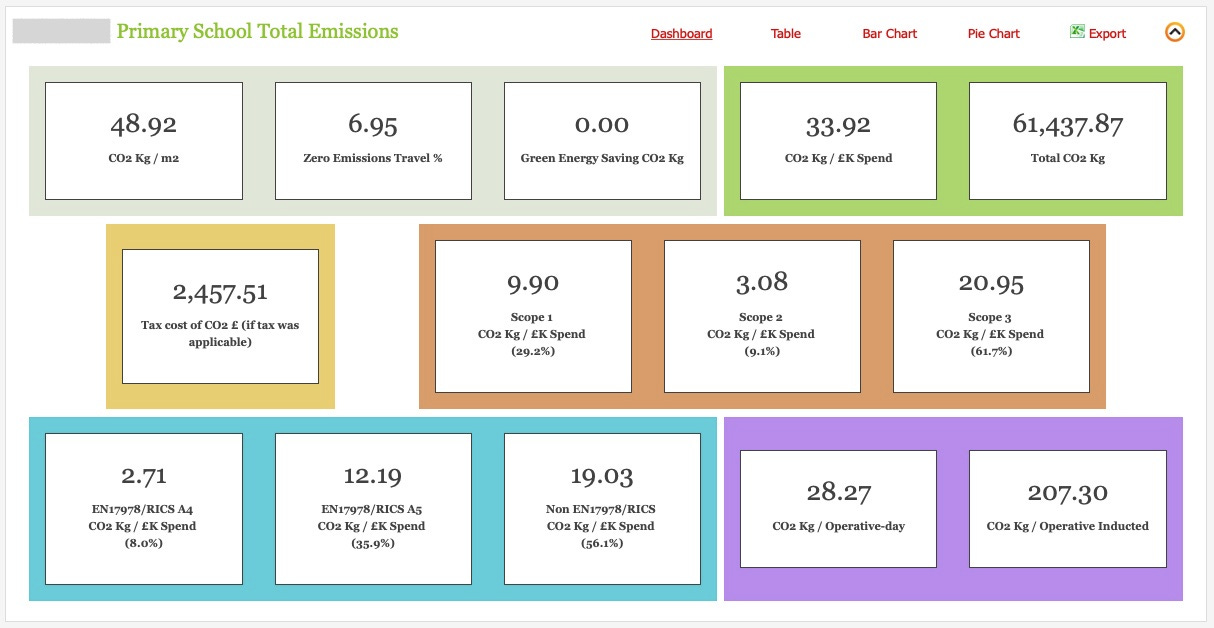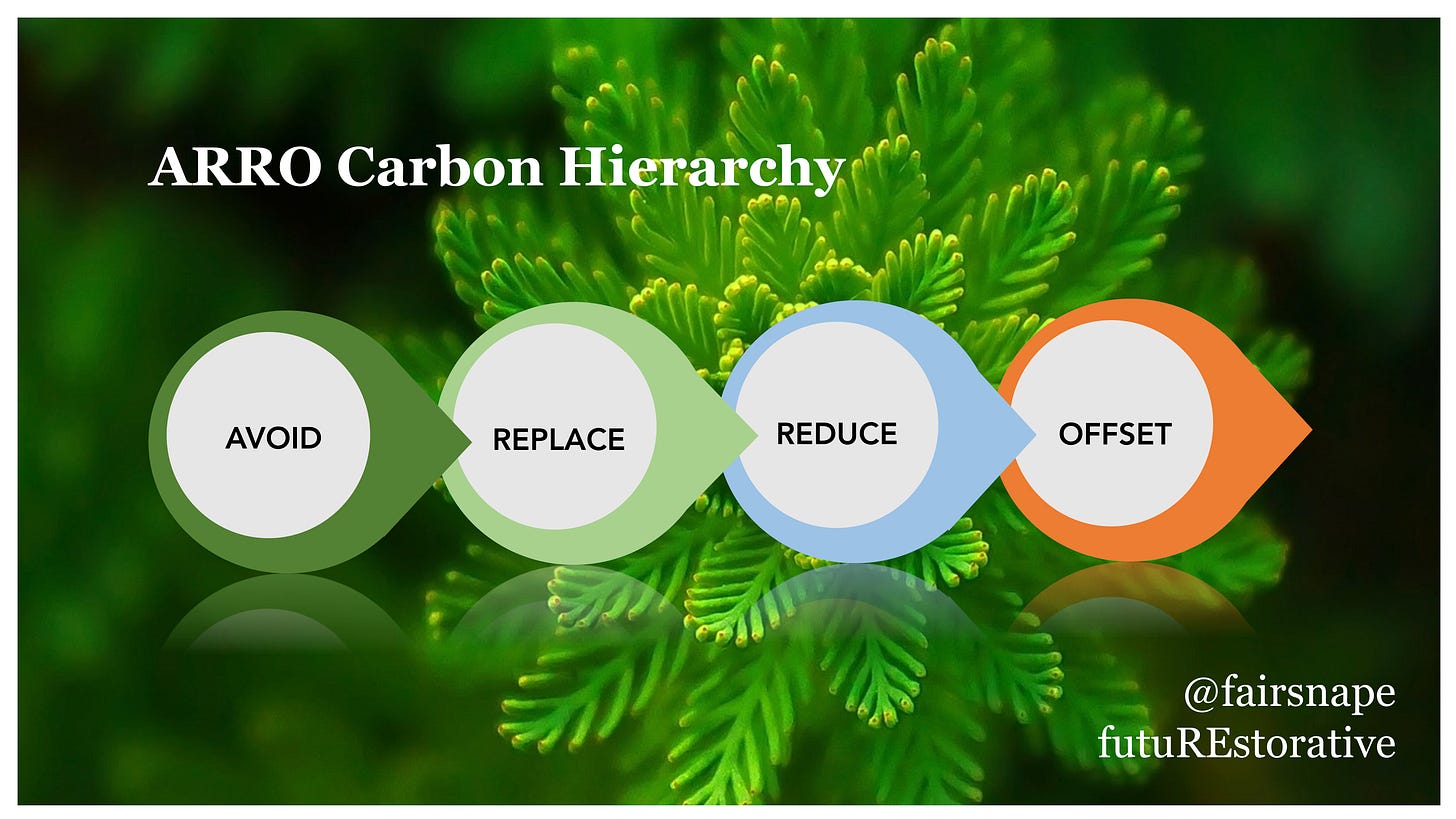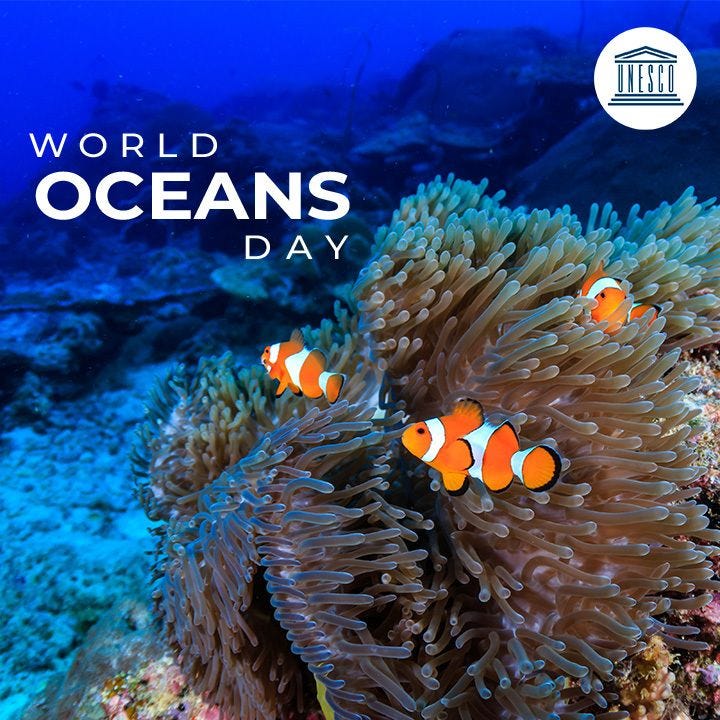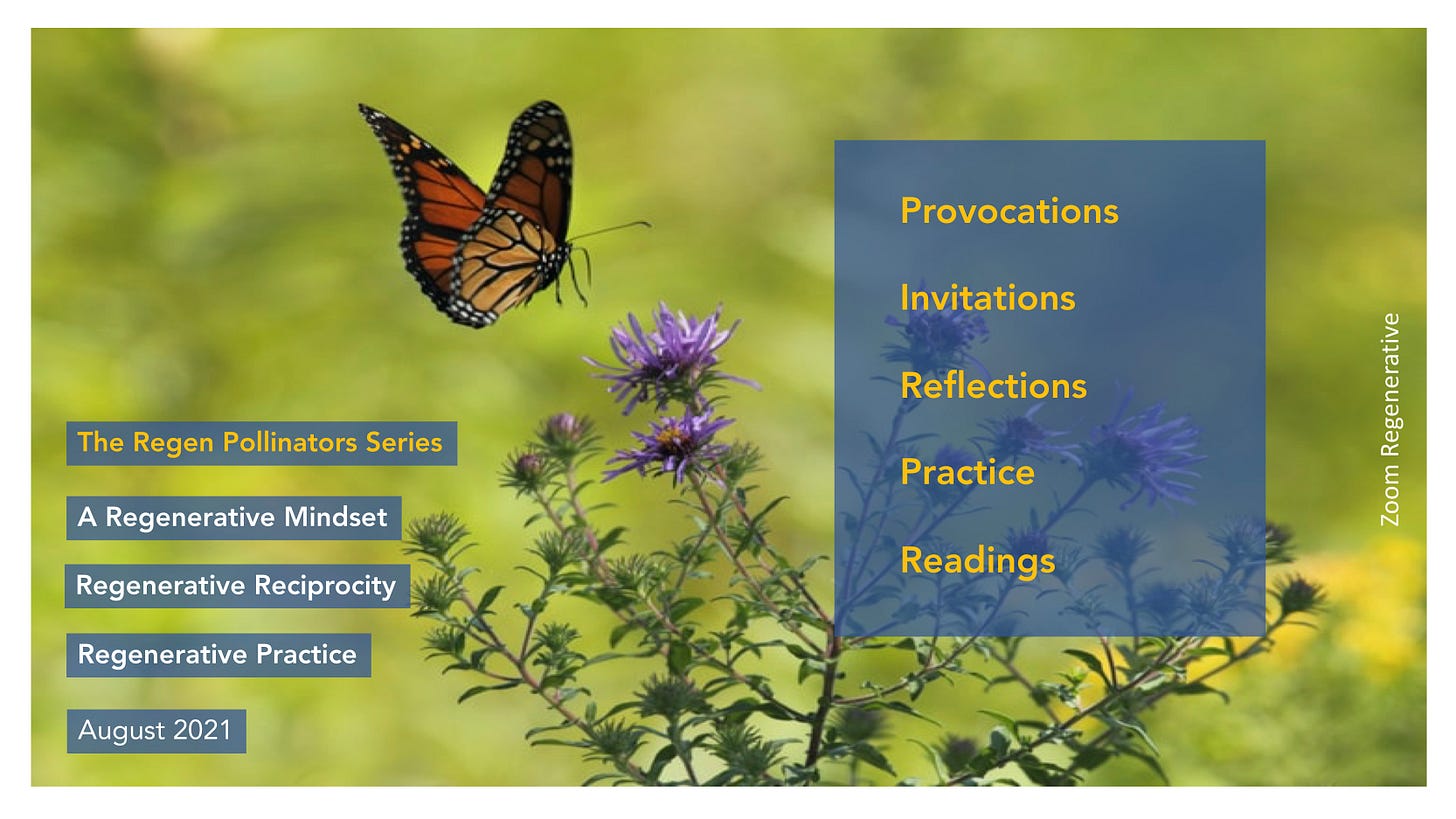Regen Notes #12
Construction Carbon, Degrowth, Reimagine, Recreate, Restore, Restord, Nature, Oceans, Quantum Leap 21, Living Future, Zoom Regenerative, Biophilia, Place and Unconference
Welcome to Regen Notes 12, a fortnightly newsletter of regenerative news, stories and more that pass through my feeds, with a sideways focus on the built environment, curated by Martin Brown. Regen Notes is a companion to Zoom Regen.
World Environment Day
The theme for this year’s World Environment Day on the 5th June was REIMAGINE. RECREATE. RESTORE. A theme echoed through Regen Notes and one we can all grown into and explore. This is our moment .. It has to be.
Carbon UK Construction
From 30 September, the UK Cabinet Office has warned contractors seeking to bid for public projects worth more than £5m a year will have to publish clear and credible carbon reduction plans before being considered. And those that fail to set out a carbon reduction plan for net-zero by 2050 will be excluded from bidding for contracts.
The new rules will require a deeper approach than just addressing scopes 1 and 2 but to manage where the majority of an organisation’s carbon footprint is emitted - within scope 3, (business travel, operative commuting, transportation, distribution and waste for example). The Cabinet Office have produced a guide with information and template plan.
The Minister for Efficiency and Transformation, Lord Agnew of Oulton, said: “The government spends more than £290bn on procurement every year, so it is important we use this purchasing power to help transform our economy to net-zero. “Requiring companies to report and commit to reducing their carbon emissions before bidding for public work is a key part of our world-leading approach. Source
The call and challenge is now with all other construction large spend clients to follow suit with a “no net-zero strategy/evidence, then no-bid opportunity” approach.
Our ConstructCO2 dashboard identifies the split of construction phase carbons across the three scopes. this give construction projects and their clients real time transparency not only on Scopes, 1, 2 and 3 but also the A4, A5 scopes from EN17978 and much more date including carbon productivity.
Construction Carbon Handprint. There is an important regenerative angle with the UK ruling, addressing Scope 3 carbons really does necessitate awareness of carbon literacy and action throughout the organisation’s supply chain. Carbon leadership from main contractors through carbon-specific supply chain development interventions and workshops, will determine the leading and successful organisations over the next decade.
Setting a date of 2050 for net-zero maybe out of kilter with current thinking and although this date should be much earlier, it is a start. Better to at least to have a 50% reduction by 2030 and then the remainder by 2050 target.
At ConstructCO2 we are running a series of 3, 45 minutes on-demand and open lunch’n.learn modules. These include monitoring construction carbon, working towards net-zero and working with your supply chain.
CO₂ Reaches Its Highest Level in More Than 4 Million Years
And if we didn’t need a reminder on the importance of taking urgent action on carbon. Sadly, as predicted, Covid related reduction had almost no effect on the rise of carbon dioxide in the atmosphere ... (Source Bloomsberg Green)
As surely as the rains fall and flowers blossom, the Northern Hemisphere awakens every June to another, less inspiring rite of spring—a new peak level for global atmospheric carbon dioxide. This year, that number is 419 CO₂ molecules for every million molecules of air, a.k.a. parts per million. Based on geological evidence collected over the six decades scientists have been tracking atmospheric CO₂, this year’s peak appears to be the highest in as long as 4.5 million years. Source
“The ultimate control knob on atmospheric CO₂ is fossil-fuel emissions,” said Ralph Keeling, a geochemist at Scripps and son of the scientist who launched measurements in 1958, “but we still have a long way to go to halt the rise, as each year more CO₂ piles up in the atmosphere. We ultimately need cuts that are much larger and sustained longer than the COVID-related shutdowns of 2020.”
Degrowth.
As Zoom Regen enters a new unconference chapter, one of the suggested topics (raised by Nooshin Akrami) from wanting to know more, and wanting to share, is the topic of Degrowth, a term gaining in popularity, driven by a need for an alternative to the growth at all costs GDP approach. Kate Raworth’s Doughnut Economics is driving regrowth within the doughnut of being within planetary constraints and above a social foundation.
An Enough! collaborative essay reflecting multiple voices on degrowth from a Highlands and Islands, or Gàidhealtachd, perspective, is a lovely and important read, resonating with many of the themes heard around the world.
Degrowth is a way of naming a vision and practice that describes the kinds of relationships between people, resources and power that foster community resilience, ecological stewardship, democratised decision making, creativity and conviviality. We reflect here on where we each see the roots and shoots of degrowth emerging in our places, lives, work and practice as a plurality of possibilities.
The Gaelic word for this is “dùthchas” - unity existing between land, people, all living creatures, nature and culture. It is an ecological balancing of with and for all.
Cáit O’Neill McCullagh reflects on the importance of the Gathering
Meeting to share news, inspirations, concerns, and ideas for ways of working together – via video calls and inevitable ‘DMs’ – the gathering appears like so many of the cyber-ventures that have emerged due to the conditions of Covid-19. In a newly-focused world of blended learning and Zoom seminars, ‘community transmission’ – once mediated from mouths to ears, and in the tacit sharing of everyday living, but now a source of viral fear – is increasingly virtual. Yet, we see now that the gathering was also another adaptive step into the ongoing of a ‘carrying stream’ This carrying is the continuum of Highlands and Islands traditions and practices nurtured, through times, as particular responses in specific environments.
The gathering represents what Ivan Illich (1981) in Shadow Work identified as ‘critical technology.’
“It has always been a radical act to tell stories during dark times. They are the regenerative spaces of creation and renewal. As we experience a loss of connection to the earth we share stories that explore the timeless connections between ecology, culture and spirituality.” (Emergence Magazine)
Removing ‘Nature’ from Vocabulary
With the words sustainability and eco becoming less and less useful, with calls for them to be banned in some institutions and organisations, writing in YaleEnvironmental 360, Michelle Nijhuis calls for dropping the word nature from our vocabularies to rediscover that true sense of connection.
... our modern habit of distancing ourselves from other forms of life isn’t as deeply rooted as it often seems. Throughout human history, plenty of societies have maintained reciprocal relationships with other species, and many still do. It’s not impossible for those of us in industrialised societies to rediscover that sense of connection — call it solidarity — and one way to start doing so is to drop “nature” from our vocabularies.
On World Ocean Day (8 June)
Rachel Carson, although primarily known for her work in Silent Spring and toxic chemicals/materials, as a marine biologist wrote several important marine focused publications, including As The Edge of the Sea in 1954
“Contemplating the teeming life of the shore, we have an uneasy sense of the communication of some universal truth that lies just beyond our grasp… the ultimate mystery of Life itself.”
Quantum Leap 21
Regenbe Costa Rica is hosting an important 3-day regenerative conference in June, with a local and global regenerative agenda and mission, that Zoom Regen and RESTORD 2030 are honoured to be part of.
QL2021 is the proposal of a campaign for the regional leap beyond sustainability, towards regenerativity and the challenge to a living future. It is based on the construction of a community of professional Latin American and Caribbean practitioners committed to transformative change with effective actions that overcome incremental change, adding positive impact value to regional contributions to the health and stability of the planet. This community will transform professionals, companies and organisations in a collaborative critical mass through cross-pollination that strengthens the work of each participant, networks and exchanges. Its scope favours the incorporation of grassroots organisations and encourages and supports decision-makers from the public and private spheres, to increase regional resilience in the face of the planetary challenges of the next 9 years.
Participants will increase their knowledge and abilities to practice regenerative development and design, green finance and materials as a particular topic focused on the construction industry.
Participants will also improve skills and abilities in the practical application of techniques, regenerative design strategies and methodologies.
Participants will deepen their networks of contacts and work, building a solid and robust regional community of regenerative practitioners.
Zoom Regen will feature in The Living and Regenerative Future: Building a Community of Communities Part 1 session on 21 June and RESTORD 2030 features in a plenary keynote on the 23rd June “RESTORD, the synergy between human beings, nature and the built environment”
LFE Master Class
Watch for news on the Living Future Europe Master Class, currently in development for enrolment and commencement in September.
Zoom Regenerative News
Zoom Regen 33 (01 June) Featured Ann Vanner sharing insights on healthy homes as part of the UCLan, UK, Thrive project looking at the first thousand days of life. ZR33 shared insights and news of upcoming events such as Quantum Leap 21 with Victor Montero and reveal exciting ZR unconference plans for future ‘unsessions’ and happenings.
Zoom Regen 34 (15 June) Biophilia … featuring Joe Clancy, WSP, co-author of the influential “14 Patterns of Biophilic Design’ guide will share from his work with 14 Patterns and Biophilic activities at WSP. Register Here
Zoom Regen 35 (29th June) Place … Featuring Marc Sherrat, Founder and Sustainability Architect at MSSA in Johannesburg, sharing insights on Place, Ecology and Connecting Buildings with nature.
Zoom Regen 36 (July) Biophilia Unsession. This marks our first session dedicated to unconference approach - we will share details on how this will work in due course, where we will be inviting you to flag aspects of biophilia you would like to know more about, or share on.
and our Zoom Regen Pollinator Tutorial Series is scheduled for a rerun, by popular request in August.








